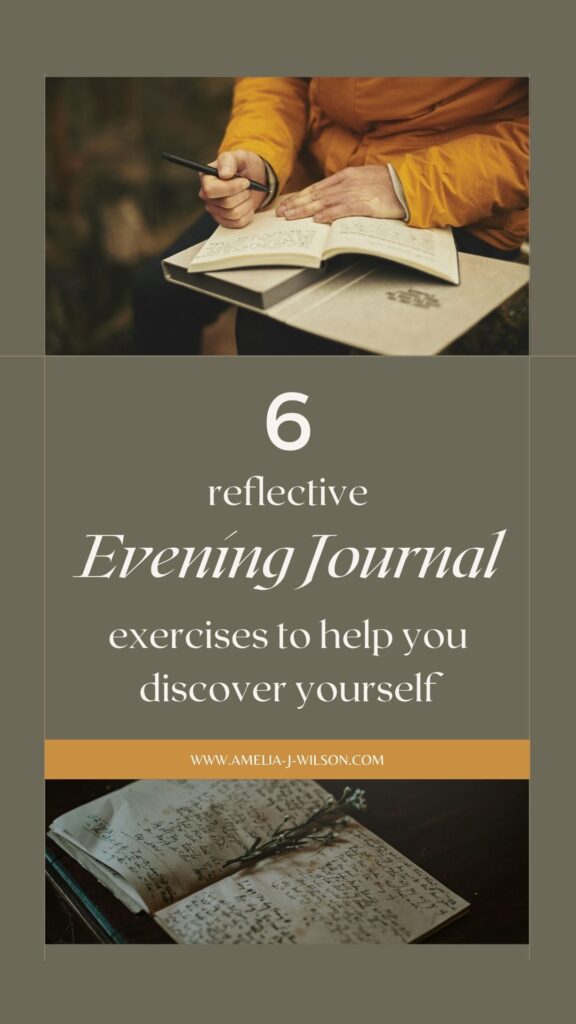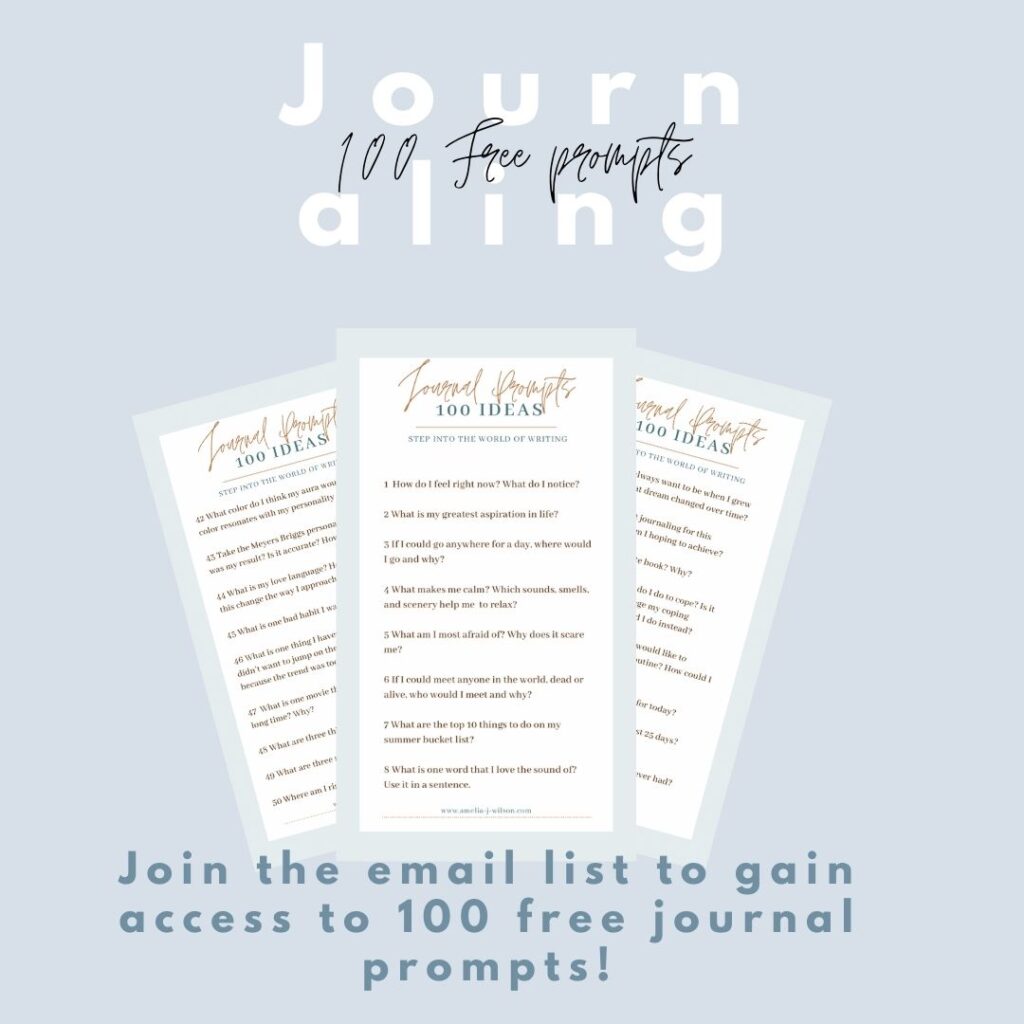Recently I made a post discussing the purpose of morning journaling and how it can benefit your daily life. Today, I’d like to dive a little deeper and talk about the benefits of evening journaling.
Evening journaling is a great activity to do to help you wind down at the end of the day. Since journaling is inherently a calm, relaxing, and soothing activity, it makes sense that it would be able to help us once we begin to wind down and prepare for bed.
I especially love journaling in the evenings because it allows us to slow down, take a deep breath, and clear our minds. Doing this can help us ground ourselves and forget our worries and fears, making it easier to fall asleep.
Disclaimer: All of the views and opinions in this post are solely my own and are not sponsored. This post may include affiliate links, meaning I earn a commission through links at no cost to you.

How it’s different from morning journaling
Now, while this post is in the same series as morning journaling, the two are completely different and provide their own unique sets of benefits. Where morning journaling can help you become focused and more prepared for the day ahead, evening journaling takes a different approach.
Evening journaling tends to be more reflective. Rather than attempting to manifest or make grandiose plans or journal in a way that affects productivity and centering the mind, evening journaling tends to be more expansive and reflective.
Evening journaling encourages you to take a deeper look at the aspects of yourself, your life, and others that may not always be so pleasant. The goal, of course, is to find a way to let all of your pent-up thoughts and feelings out onto the page and release them from your mind before bed.
As the saying goes, “it’s not good to go to bed angry,” and while evening journaling isn’t necessarily about letting out all of your anger, it is a great way to clear your mind before sleep.
Evening journal ideas
Below are some of my favorite evening journal ideas to help you tackle journaling before bed!
Reflect on the day
Reflecting on the day before bed is a great way to collect your thoughts. It gives you a moment to go through the day’s events and jot down anything noticeable. You get the chance to dive deeper into feelings and emotions you had, whether good or bad, and you get the opportunity to replay scenarios in your head.
This is a great thing to do to help ease your mind and process your thoughts from the day. Our brains naturally want to replay the events of the day before sleep, so doing it in your journal will prevent you from lying awake for too long.
Additionally, reflecting in your journal helps you process tough topics and gives you a chance to record things or events that hold meaning to you. It’s probably one of my favorite ways to journal because it is so easy and helpful. While daily journaling like this can become a bit mundane and repetitive, it is a good starting point for beginners in journaling. In addition, it serves as a gateway to journaling every single day.
Stream of conscious writing
Another fun way to journal in the evening is to perform a stream of conscious writing exercise. Stream of conscious writing is essentially writing without a prompt or a solid destination. You simply write whatever comes to mind and allow your thoughts to flow. Don’t try to force topics of conversation or stick with any single thought for too long. The goal of the exercise is to let your mind wander.
Stream of conscious writing can be difficult to achieve for some people. Not having a prompt to go off of or a purpose behind the writing can be frightening. But the goal of this exercise is to allow your thoughts to change and pop in and out with ease. When you go back to read them, you might be surprised by what topics your mind chose to talk about (or, in this case, write about!).
When performing this exercise, find a calm, quiet location and just begin writing. Start anywhere and write for at least five minutes to see where you end up. Talk about your day, your feelings, your goals, anything! This is all about self-discovery and seeing what takes precedence in your thoughts.

Gratitude
You’ve heard me say it hundreds of times by now, but gratitude journaling is a fantastic, all-around journaling exercise. And yes, this is the only journaling exercise that made it onto both lists: morning and evening. Why? Because it makes sense to do it at any time of the day.
However, with that said, I do think gratitude journaling is stronger and more appropriate for evening journaling since the evening is all about reflection. Personally, I think affirmations are better suited for morning and gratitude at night, but both could be applied whenever it feels right for you.
When it comes to evening gratitude journaling, I like to focus on what I was thankful for that day. It could be things like:
- I am grateful for spending time with friends today.
- I am grateful to have been able to create art today.
- I am grateful to have been able to play with my kitten today.
I try to focus on finding gratitude for the smaller things in life. So rather than saying, “I’m grateful for a roof over my head” (I am, of course, but for this exercise, I’m aiming for more specificity), I would say instead, “I am thankful for the opportunity to cozy up on the couch for a movie tonight.”
The goal of evening gratitude should be to find things you’re thankful for that seem small and insignificant. Finding pleasure in the little things will increase your overall happiness and encourage you to look for positivity in the little moments.
Self-discovery
As I mentioned above, with the steam of conscious exercise, self-discovery is a great thing to journal for in the evenings. We tend to be more vulnerable in the evenings and are less frazzled by our list of “to-do’s” like we are in the mornings. This means that evening is a good time to get to know yourself.
Now, journaling for self-discovery is more complicated than you might think, and I have an entire video dedicated to this aspect of journaling. I recommend watching that video because journaling for self-discovery would need a blog post all its own as I can’t fit everything in the topic here.
However, I will give you some prompts below to help you journal for self-discovery. I have more on my journal prompts page, but here are some basic ones that might help you out!
- What are you passionate about?
- What are the top three values that matter most in life?
- How do these values reflect the way you live?
- Where in your life do you need to become more fearless?
- When are you at your happiest?
- What is one thing you want to accomplish in life? Why?
Shadow work
Shadow work is another more complex journaling exercise, but can be just as beneficial as all the others, perhaps even more so! Shadow work is very similar to self-discovery, except it tends to focus on the darker side of life. Shadow work encourages you to face your fears, doubts, anxieties, and repressed memories. It asks you to dredge up negative emotions and situations and face them head-on.
Where most journaling tends to be positive and encourages optimism, shadow work isn’t like that. Now, you shouldn’t be afraid to attempt some shadow work prompts from time to time. While it can lead to heavy subjects, it will benefit you in the end. If you confront negativity and work your way through it, these bad thoughts and situations can’t have as strong of a hold over you.
One thing I want to be transparent about in my little online community is that I used to have some pretty serious bouts of depression. Shadow work is something that I discovered a little late (imo), but it helped me work through some fairly tough topics that I wasn’t prepared to discuss with anyone else.
I’m not going to linger too much on this one. Again, shadow work needs a blog post all its own. However, I will provide some journal prompts below if you’re interested in doing this for yourself.
- What is one negative thought or situation that plagues me? Why does it affect me so much?
- What am I afraid of? Why?
- What is something I regret? Why?
- Describe a negative memory or situation in detail. (You can burn the page when you’re done if you like)
- Write a letter to a person who hurt you.
- Write a letter to your younger self.
- How do I react to situations that don’t go my way? Why do I react like this?
Ultimately, shadow work strives to dive deep into the things we don’t like to talk about or think about. I encourage anyone who does shadow work to follow it up with lighter journal prompts that focus on positivity and maybe go as far as ending on a gratitude list.
Filling out gratitude lists and affirmation lists beforehand can also help. Keep those lists nearby to pull you out of the darkness that is shadow work.
Shadow work should be done when you’re in a reflective mood. While it can be done when you’re sad, please proceed with caution and be gentle with yourself. It’s tricky to discuss hurtful topics, and you should always approach them with care, forgiveness, and understanding.
Next steps
If you recall the topics I discussed in morning journaling, you’ll remember that one of the best journaling activities for that time of day is to become forward-thinking and plan for the day ahead. Mornings are about looking forward to your big goals and writing down affirmations and manifestations to continue striving towards a life you’ll love.
Evening journaling can achieve this as well. I like to call it “next steps” journaling, but really, it’s just journaling for the next day or next (insert however long here).
When journaling for next steps, ask yourself:
- What went right today?
- What went wrong?
- How can I improve tomorrow?
This is a more reflective approach than planning in morning journaling. Instead of just focusing on your goals, you’re asked to assess and reevaluate what worked and what didn’t. Try to write about what you’ve learned and how you can improve. Use this time to dive a little deeper into how you are achieving your goals and what you can continue working on in the near future.

If you like this post, check out some similar posts of mine below!
Feel free to leave a comment below and let me know any
You can also email me with questions or concerns you may have at info.amelia.wilson@gmail.com
My new book, Witch in the Water, is available on Amazon!
Also, check out my poetry book, The Lights are on but Nobody’s Home, available now on Amazon for $6.99 in paperback form!
Disclaimer: All of the views and opinions in this post are solely my own and are not sponsored. This post includes affiliate links, meaning I earn a commission through links at no cost to you.
Thanks again

